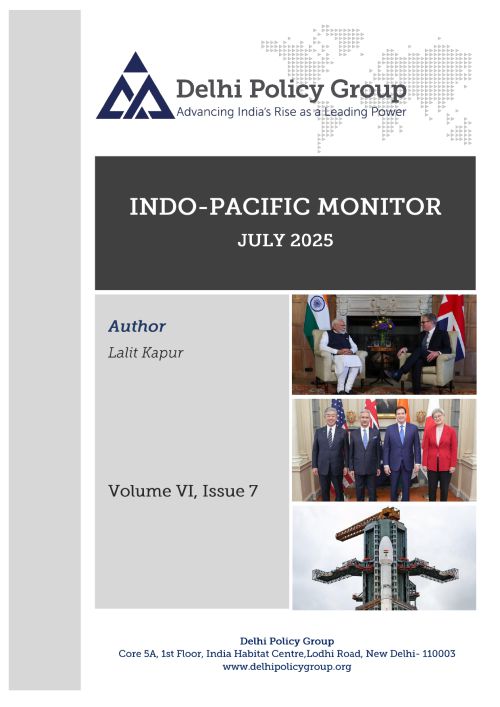Indo-Pacific Monitor
I am pleased to share with you the Indo-Pacific Monitor, Vol. VI, Issue 7, for the month of July 2025, authored by Cmde. Lalit Kapur (Retd.), Senior Fellow for Maritime Strategy.
Prime Minister Narendra Modi undertook two international tours during the month. In the first, he visited Ghana, Trinidad & Tobago, Argentina, Brazil (for the BRICS Summit) and Namibia from July 2-9. In the second, he visited the UK and the Maldives from July 22-26. The second tour witnessed the signing of the India-UK Comprehensive Economic and Trade Agreement, as well as the adoption of the India-UK Vision 2035 document, the roadmap for India-UK relations over the next decade.
Thailand’s constitutional court suspended Prime Minister Paetongtarn Shinawatra on July 01 pending a final decision on a case that seeks her dismissal over a controversial leaked phone call with Cambodia’s Hun Sen in June 2025. Cambodian and Thai troops exchanged fire along their disputed border, resulting in multiple casualties over five days, before a ceasefire was brokered by Malaysia (the current ASEAN chair) and the US.
Houthi attacks on merchant shipping in the Red Sea recommenced on July 07, with two ships being hit. The Houthis said they would attack ships if they have ties with companies that work with Israeli ports.
Elections to Japan’s House of Councillors on July 20 saw the ruling LDP-Komeito coalition being reduced to a minority in the upper house, with only 122 seats in the 248-member House. Prime Minister Shigeru Ishiba resisted calls for him to resign, citing the need to fulfil responsibilities and avoid a political drift.
The 10th Quad Ministerial Meeting was convened in Washington DC on July 01. The ministers announced a new agenda focused on four key areas: maritime and transnational security, economic prosperity and security, critical and emerging technology, and humanitarian assistance and emergency response.
Australia’s Prime Minister Anthony Albanese visited China for the Annual Leaders’ Summit from July 12-18. The visit focused on mutual economic benefit, with bilateral security issues not finding mention in public documents.
US Secretary of State Marco Rubio met China’s Foreign Minister Wang Yi on the sidelines of the EAS Foreign Ministers’ Meeting in Kuala Lumpur on July 11. Both sides described their discussions as constructive and pragmatic.
France and New Caledonia announced an agreement on July 12 that would make the French overseas territory a state within the French Republic. The agreement, which has to be approved by the French Parliament and the people of New Caledonia, gives the overseas territory greater autonomy but stops short of granting independence.
France published its revised Indo-Pacific strategy on July 22. The four part strategy comprises strengthening overseas communities; consolidating security and defence partnerships with Indo-Pacific countries; the economy and energy transition, and climate and health; and support for the European Union’s strategy in the region.
Australia paid the second instalment of US $ 525 million under AUKUS towards its contribution for bolstering the US submarine industrial base on July 23.
Australia’s largest military Exercise Talisman Sabre commenced its 11th iteration on July 13. 19 partner countries, including India, are participating in the three-week exercise.
India’s maritime capability was strengthened with the commissioning of INS Tamal on July 01 and INS Nistar on July 18.
Ships from India’s Eastern Fleet deployed to Southeast Asia during the month, visiting Singapore, Da Nang (Vietnam) and Manila (the Philippines).
The NASA-ISRO dual Synthetic Aperture Radar (NISAR) satellite was launched from India’s Satish Dhawan Space Centre, Sriharikota, on July 30.
These and other developments are covered in this Indo-Pacific Monitor Vol. VI, Issue 7. To read about them, please see the PDF attached.



